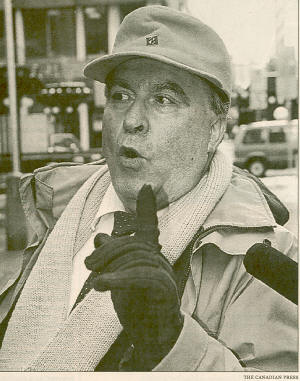Playing into Zundel's hands
by Andy Lamey
National Post
17 Dec 2004
Ernst Zundel is Canada's most notorious Holocaust denier. Over the past 20 years, he has been in and out of courtrooms many times. Last month, a Toronto judge heard closing arguments in what may well be Zundel's last Canadian trial. At issue in the hearing is whether Zundel, age 65, is a security threat. If the judge rules he is, Zundel will be deported to Germany, where he grew up, and charged with violating that country's law against Holocaust denial.

Ernst Zundel talks to reporters in Ottawa outside the Federal Court in 1996.
Zundel is a repellent figure, one who represents a horrifying combination of racism and historical blindness. But the way the government has conducted its case against him is flawed. Civil liberties have been compromised and procedural justice ignored. Never hearing from Zundel again may be an appealing prospect; but achieving that goal through the use of draconian legal measures is too high a price to pay.
The most disturbing aspect of the government's case is its use of a national security certificate. Security certificates, which can be used against any non-citizen in Canada, even permanent residents, allow the state to proclaim someone a security threat--and so deportable--after a trial that is extraordinary in two ways: Not only is secret evidence allowed, but that evidence can never be challenged.
Perhaps there are rare instances where the government genuinely needs to invoke evidence it can't reveal for reasons of national security. But the very idea of unchallenged evidence is frightening. the foundation of Canada's legal system is its adversarial nature, according to which the defence has a fundamental right to critically examine and rebut the government's case. Take away that right and the result is not a legal trial, but an Orwellian exercise in which a judge must decide whether or not to accept the Crown's case on faith.
There are five other people besides Zundel being held on security certificates in Canada, all Arab or Muslim men accused of terrorist connections. (Mohamed Harkat, of Ottawa, may be the most well-known). Any anti-racists who delight in seeing Zundel subjected to a star-chamber proceeding have to ask themselves how they would feel if the same tool were employed against an innocent immigrant. Even if some of the other suspects held on security certificates turn out to be connected to terrorism--a far from foregone conclusion--they deserve to have a lawyer with a security clearance challenge the evidence against them during the secret portion of their trials, as the Canadian Civil Liberties Association advocates.
With Zundel, there is an added concern. It involves his status as a long-term resident of Canada. Zundel is not a Canadian citizen, but with the exception of two years spent in the United States, he has lived here since 1958.
Deporting people who have spent the majority of their lives in Canada is an unjust practice. It most frequently arises in cases involving Jamaican and other immigrant families who arrive in Canada with infant children, after which the children grow up in Canada without the parents ever having taken out citizenship on their behalf. When the child gets into trouble with the law as a teen or young adult, the state then attempts to deport him to his "native Jamaica." As University of Toronto immigration expert Joseph Carens has written, this practice is "a scandal, a blatant and severe injustice against non-citizens." Deporting Zundel after 40 years of residency would add legitimacy to this indefensible practice.
The final question Zundel's case raises involves not procedure, but substance: Is he actually a security threat? Secret evidence is impossible to rebut, but the public portion of the government's case, it must be said, is weak. It consists of a long list of racists and neo-Nazis with whom Zundel has had contact over the years. The insinuation seems to be that they could be inspired by Zundel to commit some undefined act of violence, against some unidentified target, at some unknown point in the future.
But when it comes to Zundel himself, the Crown concedes that he "has virtually no history of direct personal engagement in acts of serious violence." This is a significant admission, given that the government classified Zundel as a security threat once before--in 1995, to stop him from obtaining citizenship. In effect, the government is admitting it was then wrong and that its previous prediction of violence never materialized--which only suggests how arbitrary and unchecked its definition of a security threat has become.
A better approach would be for the government to do one of two things. If it has evidence that Zundel is linked to genuine acts of violence, it should bring that evidence forward in a proper criminal prosecution and, if Zundel is convicted, send him to a Canadian prison. If the government cannot produce such evidence, Zundel should be set free to live out his remaining years in Canada, during which time he should be allowed to fester in obscurity rather than continue to be transformed into a figure of global fame, a process which Canada set in motion when it first brought Zundel to trial in 1985.
Either of these paths would be better than the one we are now on: fighting an authoritarian racist with measures that are themselves authoritarian, and can only result in serious injustices against non-citizens who will most likely be minorities.
Long-term Zundel watchers have suggested that in his many legal battles, Zundel's goal is usually not to win his case. It is to score a propaganda victory by bringing our legal system into disrepute. "The Canadian government," Zundel crowed at his deportation hearing, "short-circuited their much-vaunted due process." To our great sorrow and shame, we have proven the old fascist right.
Andy Lamey, Playing into Zundel's hands, National Post, 17-Dec-2004, p. A14.